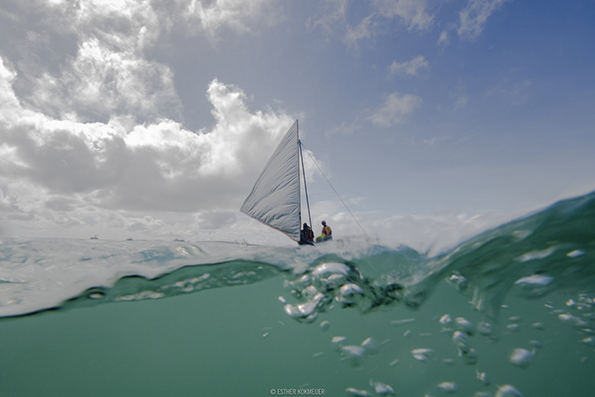Esther Kokmeijer: Deep Meaning of Voyaging
| 2018-10-11 17:32:48
Esther Kokmeijer (1977, NL)
www.estherkokmeijer.nl
Deep Meaning of Voyaging, 2018
Icw Isockor Anwell (Marshall Islands), Henrik Richter-Alten (GIZ)
Image: Deep Meaning of Voyaging, Marshall Islands. Photo Esther Kokmeijer, 2018

NL
Het werkveld van de Nederlandse kunstenaar – ontdekkingsreiziger - poolgids Esther Kokmeijer is de wereld met als focus de ‘global commons’. Ze werkt samen met wetenschappers en is geïnteresseerd in hoe kunst en wetenschap elkaar kunnen versterken.
Kokmeijer reisde in het voorjaar van 2018 met de Nederlandse oceanograaf Gerbrant van Vledder naar de Stille Oceaan, op zoek naar oorspronkelijke navigatietechnieken voor reizen over zee tussen de eilanden. Een van de minst en laatst begrepen navigatietradities is afkomstig van de Marshall-eilanden, waar 'navigators' land op afstand kunnen voelen door te detecteren hoe eilanden de golfbeweging verstoren. Ze 'lezen' de golven. Deze traditionele vaardigheden zijn bijna uitgestorven als gevolg van een rampzalige benadering van de natuur, onder druk van kolonialisme en hedendaags wereldwijd kapitalisme.
Voor Klimaat als mensenwerk nodigt Kokmeijer Isocker Anwel - kanobouwer van de Marshalleilanden - uit naar Den Haag om tijdens de tentoonstelling een traditionele ‘outrigger canoe’ te bouwen. Wat kunnen we leren van een andere relatie met onze leefomgeving en zal dit tot meer solidariteit met het landschap leiden?
Tijdens haar artist-in-residence bij Satellietgroep aan de Zandmotor (2015), heeft Kokmeijer de klimaatadaptiviteit van mensen getest met als vraag: Hoe klimaatbestendig zijn wij als mens?
EN
The world at large, with focus on the global commons, is the workfield of Dutch artist - explorer - polar guide Esther Kokmeijer. She collaborates with scientists and is interested in how art and science can reinforce each other.
In spring 2018, Kokmeijer travelled with Dutch oceanographer Gerbrant van Vledder to the Marshall Islands in the Pacific Ocean, in search of navigation techniques for sea travel between islands. One of the least and last understood navigation traditions originates from the Marshall Islands, where 'navigators' can feel land remotely by detecting how islands disturb the swell. They 'read' the waves. These traditional skills are almost extinct as result of a disastrous approach of nature through colonialism and contemporary global capitalism.
For Climate as Artifact, Kokmeijer invites Isocker Anwel, canoe builder from the Marshall Islands to The Hague to build together a traditional outrigger canoe during the exhibition. What can we learn from a different relationship with our environment and will this bring more solidarity with the landscape?
With special thanks to Alson Kelen and Tamie Bowman from WAM Marsall Islands. Wave navigation research team, oceanographer Gerbrant van Vledder, anthropologist Joseph Genz and physicist John Huth. Sustainable sea transport engineer Henrik Richter-Alten (GIZ).
During her artist-in-residency with Satellietgroep at the Zandmotor (2015), Kokmeijer tested the climate adaptivity of humans from the question: How climate resilient are we as human beings?
